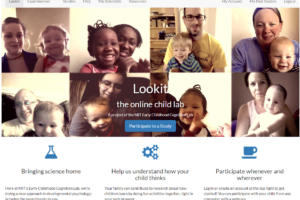Bringing science to your home! Using online tools for research on the development of babies
Using an online platform to help researchers assess how babies are developing is becoming increasingly popular and promises to revolutionize research efforts and research practices around the world. How does this work?
Originally published in Dutch on leidenpedagogiekblog
Filling out online questionnaires, surveys, reviews or opinion polls on various topics is a fairly familiar activity for most of us. While using an online platform in order to help researchers assess how babies develop is a relatively new adventure, it is becoming more and more popular and carries great promise to revolutionize research efforts and research practices around the world. How does this work? Why is it getting popular? Why would you as a parent want to participate?
Assessing cognitive development in babies
Holding our newborn baby in our hands for the first time feels like a miracle. Equally magical is the speed with which these tiny individuals grow, acquire their native language(s) and learn so much about the physical and social world around them. While we know a lot about major developmental milestones and about the social, cognitive, emotional and neurological processes involved, there are important open questions regarding the nature and constraints of both typical and atypical development.
Babies are like little scientists. They observe, try things, and have many ideas. Some of their ideas are good and some less so. They are constantly testing their ideas and building on the good ones to go on to their next exploration. Figuring out what is going on in their minds is however not an easy task for the researcher. Babies know a lot more than they are able to show. Researchers thus employ creative and playful ways to “test” babies, often relying on what babies prefer to look at or how their attention changes when interesting or novel things are shown to them. These measures tell the researcher about “information processing” and can thus help figure out what babies expect and what they already know.
Such studies typically take place at universities or research institutes, in “Babylabs” like the one we have at Leiden University. Recently, however, a few researchers, first at the Massachusetts Institute of Technology in the USA, started to think about doing some of these studies using online platforms, and here is why.
The benefits of online studies for researchers and parents
Lab studies recruit participants mostly from where the labs are situated, thus often only from university towns and their vicinities. This means that only a small section of the entire society is represented in these studies, which can introduce biases and uncertainties with regards to whether the research results are valid or generalizable. Online studies on the other hand can reach almost anyone anywhere: families with different backgrounds or occupations, living in remote villages or densely populated metropolises. In addition, online research does not need to stop at the border. For example, an online study developed by researchers at Leiden University can be completed by babies in Japan or in the USA, allowing a cross-cultural perspective and thus a better understanding of universal and culture-specific aspects of child development.
As participation in an online study takes place in the home of the families, it also allows a more natural setting for the babies.
Another important benefit of using online tools for research is that babies with specific developmental disorders, especially those that are rare, or babies with reduced mobility, can be reached more easily.
Participation in an online study can be completed at any time that is convenient for the parents, no appointment is necessary. Parents would often like to participate in our baby studies at the lab, but it can be hard to find a convenient time due to work obligations or because there are other children they have to take care of, or because they live far away. This can be particularly problematic when the study involves multiple assessments over time.
All these potential benefits had already propelled researchers to start setting up safe and reliable online platforms for developmental research, but when the pandemic hit the need for such tools suddenly increased.
Boost from the pandemic
Turning to online tools for research was evidently sped up by the difficulties of doing research in the labs due to the strict social distancing regulations that were implemented all over the world at the start of the pandemic. In the meantime, more and more people started to participate in Zoom or Teams meetings using webcams for various social- and work-related activities. This made online tools familiar even to those who rarely used them before. Being online became the new norm. Such considerations affected our Babylab as well and we launched our first online baby study earlier this year. We joined Lookit which is the online platform developed by MIT specifically for studies for babies, toddlers and young children. Lookit launched their platform in 2020 and, quoted from their website, “as of March 2021, there are over 450 researchers in our community, and around 50 universities across seven countries affiliated with Lookit”.

How does Lookit, the online developmental study site, work?
In short, after parents sign up on the website, they can choose to participate in a wide range of studies, all from their home at any time that is convenient for them. All that is needed, is a desktop computer and a webcam, and a child of course. The studies typically involve a short activity of the baby in front of the monitor, often watching interesting animations, pictures or story books. The webcam records babies’ responses and the recordings are uploaded to the platform and shared with the researchers. Most studies are suitable for a certain age. Parents can read the description of the studies beforehand to see whether they would like them.
Lookit offers very detailed information about how the platform operates, including ethical, privacy and data management issues. Many safeguards are built in, such as informed video consent to participate before starting the study, making choices about the level of privacy of the video recordings after the completion of the study, or the possibility to completely withdraw the recording. Importantly, for any study to appear on the Lookit site, it has to first pass the approval of the ethical committee of the researchers’ university as well as Lookit’s own review process.

Why would you as a parent want to participate?
The short answer is, because it is fun! The studies are designed to be attractive to babies. It is very rewarding and interesting to see how your baby reacts and behaves during the study presentation. By participating you learn about the questions that scientists are asking about the development of babies and the ways in which they try to answer these questions. These might be questions that you also ask yourself or they could be related to a parenting issue or concern that you might have. You contribute to science (from your own couch!).
Any feedback that you can provide after the completion of a study is very valuable. Imagine that you participate in a study that was set up by researchers at Tokyo University and that you can directly tell them your thoughts about what was good or bad about their design. Equally helpful is if you share the link of your favorite studies with others and encourage them to contribute too!
Not for all types of research
Online studies are of course not suitable for all types of research. They will not and should not replace lab or home studies in which personal contact, a controlled environment, or interactive settings are essential. Online research should proceed hand in hand with traditional research, but it clearly offers great opportunities, many of which we may not even be aware of today.


